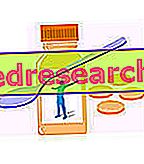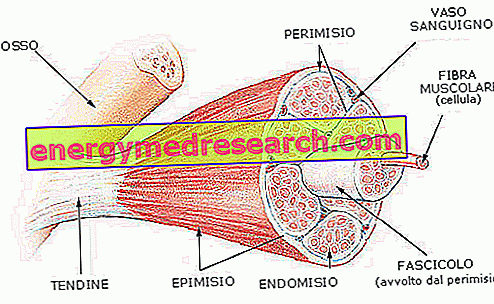Definition
Among the mental illnesses, depression plays a leading role: we are talking about a complex disorder that essentially refers to a marked alteration of mood. In other words, depression can be described as a feeling of sadness, unhappiness and frustration, often associated with anxiety, stress and suicidal thoughts.
Causes
Depression can be the result of more or less serious pathologies (eg alcoholism, renal changes, hypothyroidism and hyperparathyroidism, Hashimoto's disease, Alzheimer's and Parkinson's disease, premenstrual syndrome, tumors), but is often a consequence of psychological / emotional discomfort caused by job / sentimental disappointments, social isolation, stress, self-neglect.
Symptoms
There are many types of depression, sometimes distinguished on the basis of the severity and intensity of the symptoms that characterize them: agitation, anxiety, apathy, appearance of unexplained physical problems (back pain and headache), difficulty concentrating, insomnia / hypersomnia, lack of sexual desire, thoughts of death, loss of general interest, tendency to cry, sadness.
Diet and Nutrition
Information on Depression - Drugs for Depression Treatment is not intended to replace the direct relationship between health professional and patient. Always consult your doctor and / or specialist before taking Depression - Depression Medications.
drugs
Numerous treatments are available for treating depression; in general, in order to obtain a healing in a shorter time, the patient is subjected to cross-treatment, that is to say based on both the psychotherapeutic and pharmacological approaches. Clearly, to ward off the disease, the affected patient must have the will power and collaborate, trying to look at his surroundings from a different, better perspective: by doing so, the patient can achieve positive results in a shorter time.
As mentioned, depression is a heterogeneous and multifactorial pathological condition, so the choice of a drug instead of another, and a specialist rather than another, depends essentially on the severity of the condition. Some sufferers complain of a depression so mild that they do not even need drugs for complete recovery; others, on the other hand, fall into a depression so profound that they cannot re-emerge, neither with psychiatrists nor with antipsychotics.
Tricyclic antidepressants : useful for the treatment of medium and severe depression, possibly associated with physical pathologies. These drugs are not indicated for the treatment of acute mild depression. Furthermore, tricyclics are widely used in therapy for depression associated with altered appetite, insomnia, hypersomnia and related disorders. Most often, the very first symptom of healing is the improvement in sleep quality, clearly altered by depression.
- Amitriptyline (eg Laroxyl, Triptizol, Adepril): initially, the drug can be taken at a dose of 75 mg per day, fractionated in several doses over 24 hours; the dose can increase up to 150-200 mg. For adolescents and the elderly suffering from depression, the initial dose is 30-75 mg. The drug should be taken possibly before going to bed.
- Imipramine (eg. Imipra C FN, Tofranil): initially, the drug is taken at a dose of 75 mg a day, fractionated in several doses. Dosages can be increased up to 150-200 mg; in some hospitalized depressed patients, the dose of the drug may increase up to 300 mg a day. The maximum dose to be taken before bedtime is generally 150 mg. This dose should be reduced if administered to elderly patients.
- Nortriptyline (eg Dominans, Noritren): at the beginning of antidepressant therapy, it is recommended to take a low dose of the drug, and gradually increase it to 75-100 mg a day, to be divided into several doses during the 24 hours. For adolescents and the elderly with depression, a lower dose is recommended (30-50 mg a day).
These just described are just some of the many tricyclic drugs; among others, we mention: clomipramine, dosulepina, doxepina, trazodonelo, fepramina.
Currently, tricyclic drugs are less used in therapy because of their obvious side effects: changes in vision, anorgasmia, weight gain, hypertension, sexual difficulties, water retention, tachycardia.
Selective serotonin reuptake inhibitors : these drugs, second generation antidepressants, quickly replaced the tricyclics, given the lower side effects: these drugs, in fact, lack the cholinergic action, implicated instead in the manifestation of the side effects of the tricyclics. Selective serotonin reuptake inhibitors are not effective for severe forms of depression.
- Fluoxetine (eg. Prozac, Azur, Flotina, Fluoxeren): based on the severity of the depression, it is recommended to take the drug at a dose of 20-40 mg a day. Generally, during the first week of treatment, the drug causes nausea, a condition that still tends to disappear in a short time. Continue therapy for at least 3 weeks, unless otherwise advised by your doctor.
- Citalopram (eg. Seropram): take a dose of 20-40 mg a day. The dose can be increased after a few weeks of therapy. Do not exceed 60 mg per day for adults and 40 mg per day for the elderly.
- Sertraline (eg Zoloft, Sertraline, Tralisen): it is recommended to start therapy with an active dose of 50 mg / day. If necessary, increase the dose by 50 mg every 2-3 weeks. Do not exceed 200 mg a day. The maintenance dose is 50 mg a day.
Noradrenaline and dopamine reuptake inhibitors :
- Bupropion (eg. Elontril, Wellbutrin, Zyban): it is a drug used in therapy to treat mild and moderate forms of depression; the active ingredient, unlike the previous drugs, does not make you sleepy and interferes less on sexual desire. It is recommended to start therapy with 100 mg of active, to be taken by mouth twice a day. Maintenance dose: take 75-100 mg of drug per day, increasing the dose, when necessary, every 3 days (100 mg orally, three times a day). Do not exceed 450 mg per day, divided into 4 doses. Therapy should be continued until the symptoms are remedied or as determined by the doctor. The drug is widely used in smoking cessation therapy.
Serotonin and norepinephrine reuptake inhibitors:
- Duloxetine (eg Xeristar, Yentreve, Ariclaim, Cymbalta): indicated for the treatment of major depression (in which the patient complains of severe mood depression for at least two consecutive weeks). It is recommended to take a dose of 40 mg of the drug, divided in a double dose of 20 mg in 24 hours. In some cases, it is possible to take two doses of 30 mg each, without food.
- Venlafaxine (eg Efexor): indicated to treat depression and generalized anxiety. Compared to tricyclic antidepressant drugs, Venlafaxine does not generate the typical antimuscarinic and sedative side effects. At the beginning of the treatment, it is recommended to take 75 mg of active per day, preferably fractionated in two doses; continue for 3-4 weeks. If necessary, in this first period, it is possible to increase the dose up to 150 mg (split in two doses). In case of severe depression, increase the dosage by 75 mg every 2-3 days. Do not exceed 375 mg per day.
Monoamine oxidase inhibitors (MAOIs): these drugs represent the last resort, when the treatment of depression with tricyclic drugs or with SSRIs has not brought any truly evident benefit to the depressed patient. These are second choice drugs due to the side effects they can generate. MAOIs are often available as a combination of several drugs, in order to enhance the final effect and reduce treatment times, consequently the chances of occurrence of side effects decrease.
- Fenelzina (eg Margyl): start therapy with 15 mg of drug, three times a day. Maintenance dose: if necessary, increase the dosage up to 60-90 mg a day. After obtaining the maximum benefit from the drug, it is recommended to gradually decrease the dosage (15 mg a day and every other day), until the administration is finished.
- Isocarboxazide (eg. Marplan): start therapy for depression by taking 10 mg of active, twice a day. It is possible to increase the dose of 10 mg every 2-4 days, up to 40 mg a day during the first week of therapy. Subsequently, increase, if necessary, 20 mg each week (do not exceed 60 mg / day). Always divide the dosage in 2-4 doses. Also in this case, after obtaining the maximum therapeutic response, gradually decrease the administration of the drug, to avoid the rebound effect. The maintenance dose is 40 mg per day, divided into several doses. Consult your doctor.
- Tranylcypromine (eg Parmodalin): compared to phenelzine and isocarboxazide, this drug is the most dangerous in terms of side effects, in addition to being the most exciting. In fact, the recommended dose for the treatment of depression (10 mg, twice a day in the first week; 30 mg a day in the second week; 10 mg a day for the maintenance dose) should not be administered after 15.00 (gives insomnia due to hyper-excitability). This drug is contraindicated for treating a child's depression.



